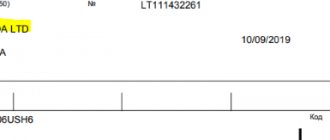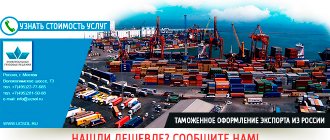The main essence of customs clearance is based on the compliance by all participants in foreign economic activity with the rules, norms and requirements of customs legislation for the movement of goods or products across the customs border. Therefore, an important stage in the successful implementation of the customs clearance procedure is the declaration process, the essence of which is the application (submission) to the customs authorities in the prescribed form of information about the product, the customs regime or other data necessary for customs purposes when it crosses the border.
Customs declaration, being a mandatory customs procedure, is legally regulated by the Customs Code and other legal acts of the Russian Federation for the purposes of:
- establishing control over the movement of material objects across the Russian customs border;
- creating barriers when trying to export national values from the country;
- collection of a certain amount of customs duties for the import of products;
- the formation of various restrictions on the basis of current legislative norms when allowing cargo hazardous to the health of citizens into the territory of the country;
- implementation of the fight against administrative violations.
Declaration is carried out in the following cases:
- movement of goods, cargo or transport across the customs border of Russia;
- changes in the customs regime (for example, in cases of sale to the buyer of goods stored in a customs warehouse, the regime of the customs warehouse changes to the regime of release of products for free circulation);
- other procedures determined by the norms of Russian legislation (for example, products placed under the customs regime of duty-free trade are subject to repeated customs clearance, which provides for the submission of a new sample customs declaration in the event of revocation or cancellation of the license for a given store, as well as in cases related to its liquidation).
The results of declaration of products or transport can be used by representatives of customs authorities as:
- law enforcement purposes - to effectively combat smuggling or other violations of customs regulations;
- tax purposes – preparation of a tax return;
- administrative regulation of foreign economic activity - licensing, quotas, etc.;
- organizing other types of state control at the border - veterinary, environmental, phytosanitary, radioactive control, etc.;
- maintaining customs (foreign trade) statistics, etc.
The principle of customs declaration involves the provision of basic data necessary for completing customs formalities and calculating the amount of customs duties by the person moving the cargo (declarant) or by a customs broker.
Customs declaration forms
The legislation provides the following forms for submitting a declaration and other documents.
- Oral. Relevant only for individuals crossing the state border by personal or public transport. However, their cargo or luggage must be personal in nature and not intended for commercial use. This form makes it possible to implement the “green corridor” principle, when a person who does not need to declare commercial cargo moves into one stream, and those who need to carry out this procedure move into another stream. This saves time for both individuals and customs authorities.
- Written. It is mandatory when transporting/transporting goods/commercial goods across the border.
- Electronic. An alternative to traditional writing. All documents are submitted through a special website, which significantly reduces the time required to clear customs control.
Submission and Acceptance
Correctly filling out the document and submitting reliable information is an important step, without which it will be impossible to legalize the export or import of goods or cargo across the border.
The document is submitted either by the declarant himself or his representative; legal entities and individual entrepreneurs do this remotely, namely in electronic form. Declaration forms can be obtained directly from customs when crossing the border, and can also be downloaded from the website.
Immediately before submission, the application is checked again by our specialists, which allows us to avoid the slightest inaccuracies. After all documents are verified, duties and fees are paid, payment documents are also submitted to the customs authority, TD can be submitted at any customs post of the Russian Federation. After receiving the application from the declarant, the inspector checks the correctness of all the information entered; if no complaints have arisen, then the TD is assigned a number and certified with a seal that export or import is permitted, which means that the declaration has been accepted.
Features of goods declaration
Russia is one of the initiators of the creation of the Customs Union. The peculiarities of declaring goods in the economic union zone are that there are 2 options for declaring:
- goods produced on the territory of countries included in the Customs Union;
- goods of foreign origin.
Material assets are considered goods from the vehicle:
- produced on the territory of states that are members of the Customs Union;
- moved within the borders of the vehicle;
- received the appropriate status.
Such goods move freely throughout the territory of countries that are members of the Customs Union and are not subject to customs formalities.
Any other products that do not meet the above criteria receive the status of foreign goods. And they automatically fall under all formalities and procedures.
The procedure for customs declaration of goods
The procedure for customs declaration of goods largely depends on the chosen type of customs declaration (CD). When importing into the Russian Federation, you must fill out one of the types of declaration: cargo, incomplete, periodic and declaration for goods transported by individuals for personal, not commercial use.
The last type concerns only individuals, and in the context of this article it is not interesting to us. Let's take a closer look at those declarations that are used to register commercial cargo.
Cargo customs declaration (CCD) is a document that contains all the information necessary for correct customs control.
An incomplete customs declaration must contain information:
- necessary for the smooth release of goods;
- confirming compliance with the prohibitions and restrictions in force in the Russian Federation;
- necessary for the correct calculation and payment of customs duties;
- allowing for correct identification of goods.
A periodic customs declaration is completed if the same person transports identical goods during a specific period of time.
Preliminary customs declaration allows you to fill out a customs declaration for foreign-made goods before their physical arrival at the customs point in the Russian Federation or until the internal customs transit is completed. After submitting such a document, the declarant has 15 calendar days to present the goods for customs control. Otherwise, it is considered that the declaration has not been filed.
Eurasian Economic Commission
Article 179. General provisions on customs declaration of goods1. Goods are subject to customs declaration when placed under a customs procedure or in other cases established in accordance with this Code.
2. Customs declaration of goods is carried out by the declarant or a customs representative acting on behalf of and on behalf of the declarant.
3. Customs declaration is made in written and (or) electronic forms using a customs declaration.
Article 180. Customs declaration
1. When customs declaring goods, depending on the declared customs procedures and persons moving the goods, the following types of customs declaration are applied:
1) declaration of goods;
2) transit declaration;
3) passenger customs declaration;
4) declaration for the vehicle.
The forms and procedure for filling out a customs declaration are determined by a decision of the Customs Union Commission.
2. The list of information to be indicated in the customs declaration is limited only to information that is necessary for the calculation and collection of customs duties, the formation of customs statistics and the application of the customs legislation of the customs union and other legislation of the member states of the customs union.
3. Information to be indicated in the customs declaration for goods and transit declaration depending on the customs procedure, categories of goods, persons moving them, type of transport, may be reduced by a decision of the Customs Union Commission or the legislation of the member states of the customs union, if this is provided for by a decision of the Customs Union Commission union.
The information to be indicated in the passenger customs declaration and in the declaration for the vehicle is established by a decision of the Customs Union Commission.
4. Transport (shipping), commercial and (or) other documents containing information necessary for the release of goods in accordance with the customs procedure may be used as a customs declaration in cases and in the manner determined by this Code or a decision of the Customs Union Commission.
5. The customs declaration may be submitted in the form of an electronic document in accordance with this Code.
The procedure for submitting and using a customs declaration in the form of an electronic document is determined by a decision of the Customs Union Commission.
6. Submission of a customs declaration in writing must be accompanied by the submission of an electronic copy to the customs authority, unless otherwise established by a decision of the Customs Union Commission.
The structure and format of the electronic copy of the customs declaration, as well as the procedure for its submission and use, are determined by this Code, the decision of the Customs Union Commission or the legislation of the member states of the customs union in cases provided for by the decision of the Customs Union Commission.
Article 181. Declaration of goods
1. When placed under customs procedures, with the exception of the customs procedure of customs transit, a declaration for the goods is submitted to the customs authority.
2. The declaration of goods shall indicate the following basic information, including in coded form:
1) the declared customs procedure;
2) information about the declarant, the customs representative, the sender and the recipient of the goods;
3) information about vehicles used for the international transportation of goods and (or) their transportation through the customs territory of the customs union under customs control;
4) information about vehicles for international transportation and (or) vehicles on which goods were transported (will be transported) through the customs territory of the customs union under customs control;
5) information about goods:
Name;
description;
classification code of goods according to the Commodity Nomenclature of Foreign Economic Activity;
name of country of origin;
name of the country of departure (destination);
description of packages (quantity, type, marking and serial numbers);
quantity in kilograms (gross weight and net weight) and in other units of measurement;
customs value;
statistical cost;
6) information on the calculation of customs duties:
rates of customs duties, taxes, customs duties;
application of benefits for the payment of customs duties;
amounts of calculated customs duties, taxes, customs fees;
the exchange rate established in accordance with the legislation of a member state of the customs union and used to calculate customs duties in accordance with this Code;
7) information about the foreign economic transaction and its main conditions;
 information about compliance with restrictions;
information about compliance with restrictions;
9) information about the manufacturer of the goods;
10) information confirming compliance with the conditions for placing goods under the customs procedure;
11) information about documents submitted in accordance with Article 183 of this Code;
12) information about the person who prepared the goods declaration;
13) place and date of drawing up the goods declaration.
Article 182. Transit declaration
1. When placing goods under the customs procedure of customs transit, a transit declaration is submitted to the customs office of departure.
2. Transport (transportation), commercial and (or) other documents, including those determined by international treaties, containing the information specified in paragraph 3 of this article may be submitted as a transit declaration.
3. The transit declaration must contain the following information about:
1) the sender, recipient of goods in accordance with transport (transportation) documents;
2) country of departure, country of destination of goods;
3) the declarant;
4) the carrier;
5) a vehicle for international transportation on which goods are transported;
6) name, quantity, cost of goods in accordance with commercial, transport (shipment) documents;
7) the code of goods in accordance with the Harmonized System of Description and Coding of Goods or the Commodity Nomenclature of Foreign Economic Activity at the level of at least the first six characters;
 the gross weight of goods or volume, as well as the quantity of goods in additional units of measurement (if such information is available) for each code of the Commodity Nomenclature of Foreign Economic Activity or the Harmonized System for Description and Coding of Goods;
the gross weight of goods or volume, as well as the quantity of goods in additional units of measurement (if such information is available) for each code of the Commodity Nomenclature of Foreign Economic Activity or the Harmonized System for Description and Coding of Goods;
9) the number of cargo pieces;
10) the destination of goods in accordance with transport (shipment) documents;
11) documents confirming compliance with restrictions related to the movement of goods across the customs border, if such movement is permitted in the presence of these documents;
12) planned reloading of goods or cargo operations in transit.
If the documents specified in paragraph 2 of this article accepted as a transit declaration do not contain all the information specified in this paragraph, the missing information must be contained in the documents attached to such a transit declaration or the documents accompanying it, submitted to the customs authority.
4. The customs authority does not have the right to require the declarant to provide other information, with the exception of the information specified in paragraph 3 of this article.
5. The transit declaration is registered by the customs authority, including using information systems and information technologies used by customs authorities.
The procedure for submitting and registering a transit declaration is determined by a decision of the Customs Union Commission.
Article 183. Submission of documents during customs declaration of goods
1. Submission of a customs declaration must be accompanied by the submission to the customs authority of documents on the basis of which the customs declaration is completed, unless otherwise established by this Code.
Such documents include:
1) documents confirming the authority of the person submitting the customs declaration;
2) documents confirming the completion of a foreign economic transaction, and in the absence of a foreign economic transaction - other documents confirming the right of ownership, use and (or) disposal of goods, as well as other commercial documents available to the declarant;
3) transport (shipping) documents;
4) documents confirming compliance with prohibitions and restrictions;
5) documents confirming compliance with restrictions in connection with the use of special protective, anti-dumping and countervailing measures;
6) documents confirming the country of origin of goods in cases provided for by this Code;
7) documents on the basis of which the classification code of the product was declared according to the Commodity Nomenclature of Foreign Economic Activity;
 documents confirming payment and (or) security for payment of customs duties;
documents confirming payment and (or) security for payment of customs duties;
9) documents confirming the right to benefits for the payment of customs duties, to apply full or partial exemption from customs duties and taxes in accordance with customs procedures established by this Code, or to reduce the base (tax base) for calculating customs duties and taxes;
10) documents confirming the change in the deadline for payment of customs duties and taxes;
11) documents confirming the declared customs value of goods and the chosen method for determining the customs value of goods;
12) a document confirming compliance with the requirements in the field of currency control, in accordance with the currency legislation of the member states of the customs union.
13) a document on registration and nationality of a vehicle of international transportation - in the case of transportation of goods by road when they are placed under the customs procedure of customs transit.
If the documents specified in this paragraph do not contain the information declared in the customs declaration, other documents are submitted on the basis of which the customs declaration is completed.
When submitting a declaration for goods to be placed under the customs procedure for the export of goods to which export customs duties are not applied, it is not necessary to submit to the customs authority documents other than those specified in subparagraphs 1), 2), 5), 8), 9) and 13) of this paragraph, as well as in subparagraph 3) of this paragraph - if such documents are available.
2. List of documents submitted during customs declaration of goods, depending on the form of customs declaration (written, electronic), types of customs declaration, customs procedure,
categories of goods and persons may be reduced in accordance with the customs legislation of the customs union or the legislation of the member states of the customs union.
3. If individual documents on the basis of which the customs declaration is completed cannot be presented when submitting the customs declaration, upon a reasoned request of the declarant, the customs authority allows the submission of such documents before the release of goods,
and in cases provided for by the legislation of the member states of the customs union - after the release of goods.
4. When declaring goods through customs, original documents or copies thereof are presented. The customs authority has the right to check the compliance of copies of submitted documents with their originals in cases established by the legislation of the member states of the customs union.
If, during the customs declaration of goods, documents that are used for customs declaration were previously submitted to the customs authority, it is sufficient to submit copies of such documents or indicate information about the submission of such documents to the customs authority.
5. When declaring goods through customs, documents may be submitted in the form of electronic documents in accordance with this Code.
The procedure for submitting and using electronic documents is determined by the customs legislation of the Customs Union.
6. Submission of a customs declaration in electronic form may not be accompanied by the submission to the customs authority of documents on the basis of which the customs declaration is completed, including documents established by Articles 240, 253, 265, 294, 299 and 308 of this Code, if previously submitted to the customs authority such documents, or they can be presented subsequently in accordance with the legislation of a member state of the customs union.
7. Customs authorities may accept and use during customs declarations documents and information compiled in the official languages of the member states of the customs union and in foreign languages.
The customs authority has the right to require translation of information contained in documents drawn up in a language that is not the state language of a member state of the customs union, to whose customs authority such documents are submitted during customs declaration.
Article 184. Additional documents submitted during customs declaration in accordance with the terms of customs procedures
When customs declaring goods in accordance with the terms of the declared customs procedures, in addition to the documents specified in Article 183 of this Code, documents established by Articles 240, 253, 265, 294, 299 and 308 of this Code are submitted, and in the case of establishing customs procedures in accordance with :
paragraph 2 of Article 202 of this Code - international treaties of the member states of the customs union;
paragraph 3 of Article 202 of this Code - the legislation of the member states of the customs union.
Article 185. Deadlines for filing a customs declaration
1. A customs declaration for goods imported into the customs territory of the Customs Union is submitted before the expiration of the temporary storage period for goods, unless otherwise established by this Code.
2. A customs declaration for goods exported from the customs territory of the customs union is submitted before their departure from the customs territory of the customs union, unless otherwise established by this Code.
3. A customs declaration in respect of goods that were an instrument, means of committing or the subject of an administrative offense or crime, in respect of which a decision was made to return them and which are subject to customs declaration in accordance with this Code, is submitted within 30 (thirty) days from the date entry into force:
1) court decisions on exemption from criminal (administrative) liability;
2) decisions of the customs authority (official) on exemption from administrative liability;
3) a decision of a court or customs authority (official) to terminate proceedings in a criminal (administrative) case;
4) decisions of the court or customs authority (official) to bring to administrative or criminal liability.
4. The goods specified in paragraph 3 of this article, for which the customs declaration is not submitted within the prescribed period, are detained by customs authorities in accordance with Chapter 21 of this Code.
Article 186. Declarant
Declarants can be:
1) a person of a member state of the customs union:
who has concluded a foreign economic transaction or on whose behalf (on behalf of) this transaction was concluded;
having the right to own, use and (or) dispose of goods - in the absence of a foreign economic transaction;
2) foreign persons:
an individual moving goods for personal use;
a person enjoying customs benefits in accordance with Chapter 45 of this Code;
an organization that has a representative office established on the territory of a member state of the customs union in the prescribed manner - when applying for customs procedures for temporary import, re-export, as well as customs procedures for release for domestic consumption only in relation to goods imported for the own needs of such representative offices;
a person who has the right to dispose of goods not within the framework of a transaction, one of the parties to which is a person from a member state of the customs union;
3) for the application of the customs procedure for customs transit - the persons specified in subparagraphs 1) and 2) of this article, as well as:
carrier, including customs carrier;
freight forwarder, if he is a person of a member state of the customs union.
Article 187. Rights of the declarant
When declaring goods at customs and performing other customs operations necessary to place goods under the customs procedure, the declarant has the right to:
1) inspect, measure and carry out cargo operations with goods under customs control;
2) take samples and specimens of goods under customs control with the permission of the customs authority, subject to the conditions provided for in Article 155 of this Code;
3) be present during the customs inspection and customs examination of goods by customs officials and when these persons take samples of goods;
4) get acquainted with the results of studies of samples and specimens of the goods declared by him, available at the customs authorities;
5) submit documents and information in the form of electronic documents in accordance with this Code;
6) appeal decisions of customs authorities, actions (inaction) of customs authorities or their officials;
7) attract experts to clarify information about the goods declared by him;
 use other powers and rights provided for by this Code.
use other powers and rights provided for by this Code.
Article 188. Obligations of the declarant
When declaring goods at customs and performing other customs operations necessary to place goods under the customs procedure, the declarant is obliged to:
1) make customs declaration of goods;
2) submit to the customs authority the documents on the basis of which the customs declaration is filled out, unless otherwise established by the customs legislation of the customs union;
3) present the declared goods in the cases established by this Code, or at the request of the customs authority;
4) pay customs duties and (or) ensure their payment in accordance with this Code;
5) comply with the requirements and conditions for the use of goods in the relevant customs procedure;
6) fulfill other requirements provided for by this Code.
Article 189. Liability of the declarant
The declarant is responsible in accordance with the legislation of the member states of the Customs Union for failure to fulfill the obligations provided for in Article 188 of this Code, as well as for the statement of false information specified in the customs declaration, including when the customs authorities make a decision on the release of goods using a risk management system .
Article 190. Submission and registration of a customs declaration
1. A customs declaration is submitted by the declarant or a customs representative to the customs authority authorized in accordance with the legislation of the member states of the customs union to register customs declarations.
2. The date and time of submission of the customs declaration, its electronic copy and the necessary documents are recorded by the customs authority, including using information technology.
3. The customs authority registers or refuses to register a customs declaration within no more than 2 (two) hours from the moment of filing the customs declaration in the manner determined by the decision of the Customs Union Commission.
4. The customs authority refuses to register a customs declaration if:
1) the customs declaration has been submitted to a customs authority not authorized to register customs declarations;
2) the customs declaration was submitted by an unauthorized person;
3) the customs declaration does not contain the necessary information provided for in Articles 180 – 182 of this Code;
4) the customs declaration is not signed or not properly certified or is not drawn up in the prescribed form;
5) in relation to the declared goods, actions have not been taken that, in accordance with this Code, must be performed before filing or simultaneously with filing a customs declaration.
5. Refusal to register a customs declaration is formalized by an official of the customs authority in writing, indicating the reasons for the refusal.
In case of refusal to register a customs declaration, the customs declaration and submitted documents are returned to the declarant or customs representative.
6. If a customs declaration is not registered by the customs authority, such a declaration is considered not submitted for customs purposes.
7. From the moment of registration, the customs declaration becomes a document evidencing facts of legal significance.
8. The provisions of paragraphs 2 and 3 of this article do not apply when declaring goods placed under the customs procedure of customs transit.
Article 191. Changes and additions to information declared in the customs declaration
1. Information declared in the customs declaration may be changed or supplemented before the release of goods with the permission of the customs authority upon a reasoned written request from the declarant, while simultaneously meeting the following conditions:
if the changes and additions made do not affect the decision on the release of goods and do not entail the need to change information affecting the determination of the amount of customs duties, except for cases of adjustment of the customs value of goods, and compliance with prohibitions and restrictions;
if by the time the declarant receives the request, the customs authority has not notified him of the place and time of the customs inspection and (or) has not made a decision to conduct other forms of customs control in relation to the goods.
Changes and additions to the information declared in the registered customs declaration cannot entail the declaration of information about goods other than those indicated in the registered customs declaration.
2. Making changes and additions to the customs declaration after the release of goods is permitted in cases and in the manner determined by the decision of the Customs Union Commission.
3. Customs authorities do not have the right, on their own initiative, instructions or request of a person, to fill out a customs declaration, change or supplement the information specified in the customs declaration, with the exception of those information, the entry of which is within the competence of the customs authorities, adjustments to the customs value of goods and (or) changes after the release of goods, other information affecting the determination of the amount of customs duties and compliance with prohibitions and restrictions made in accordance with the provisions of the customs legislation of the Customs Union.
Article 192. Revocation of a customs declaration
1. Upon written request of the declarant, the registered customs declaration for foreign goods may be revoked by him before the customs authority makes a decision on the release of goods.
When a customs declaration is withdrawn, a new customs declaration must be submitted within the period of temporary storage of goods.
If a customs declaration is not submitted within the period specified in part two of this paragraph, the goods are detained by customs authorities in accordance with Chapter 21 of this Code.
2. At the written request of the declarant, the customs declaration for goods of the customs union may be revoked before the actual departure of the goods from the customs territory of the customs union, including after a decision has been made to release the goods.
To revoke a customs declaration for goods of the Customs Union, the withdrawal request must indicate the location of the goods.
3. Revocation of a customs declaration is permitted with the written permission of the customs authority, if, before receiving the declarant’s application, the customs authority did not notify the declarant of the place and time of the customs inspection of the goods declared in the customs declaration, and (or) did not establish violations of the customs legislation of the Customs Union, entailing administrative penalties. or criminal liability.
A customs declaration may be revoked after a customs inspection of the goods, if during such inspection no violations of the customs legislation of the Customs Union that entail administrative or criminal liability were established.
Article 193. Preliminary customs declaration of goods
1. A customs declaration may be submitted in respect of foreign goods before their importation into the customs territory of the customs union.
2. If transport (carriage) or commercial documents accompanying goods must be used for customs purposes, during the preliminary customs declaration of goods, the customs authority accepts copies of these documents certified by the declarant or information from these documents in electronic form and, after presenting the goods to the customs authority, compares the information contained in copies of these documents, with the information contained in the original documents, including electronic documents.
3. When making a preliminary customs declaration, the customs declaration may lack information that, by its nature, cannot be known to the declarant before the import of goods into the customs territory of the Customs Union and (or) their presentation to the customs authority.
Such information must be included in the customs declaration before a decision is made on the release of goods in the manner determined by the decision of the Customs Union Commission.
4. In the event of a change in cost, quantity or weight indicators that differ from those previously declared on the basis of copies of transport (transportation) or commercial documents, documents confirming the change in cost, quantity or weight must be submitted.
5. If, after the import of goods into the customs territory of the Customs Union, the declarant discovers a discrepancy in value, quantity or weight indicators different from those previously declared, the declarant has the right to withdraw the customs declaration in the manner prescribed by Article 192 of this Code.
6. If the goods are not presented to the customs authority that registered the customs declaration, or to another customs authority determined in accordance with the legislation of a member state of the customs union, within 30 (thirty) calendar days from the day following the day of its registration, or during this prohibitions and restrictions are introduced, the customs authority refuses to release such goods.
Article 194. Features of customs declaration of goods
Depending on the categories of goods and persons moving them, in accordance with the customs legislation of the Customs Union and (or) the legislation of the member states of the Customs Union, specifics of customs declaration of goods may be established, including in the following cases:
1) if the declarant does not have accurate information necessary for customs declaration;
2) with regular movement of goods across the customs border by the same person over a certain period of time;
3) when moving goods by pipeline transport and along power lines;
4) when moving goods in an unassembled or disassembled form, including incomplete or unfinished form, for a specified period of time.
Declaration of goods: documents
Documents for declaring goods are a very extensive list of papers, the composition of which greatly depends on the category of imported goods. The following groups of documents are distinguished:
- confirming the status and powers of the person who executed the TD;
- transport;
- confirming the right to own goods or complete a foreign economic transaction;
- confirming the country of origin of the product;
- related to the vehicle;
- confirming payment of customs duties and charges;
- confirming compliance with restrictions and prohibitions of an anti-dumping, compensatory or protective nature and others.
This list may vary depending on the cargo, the selected customs regime, the importing country and other factors. Full information about what documents need to be prepared can be obtained from the customs brokers of the Major company, who have extensive practical experience in this field.
What information is indicated in the customs declaration
Let us repeat that a customs declaration is a document of a standard form, drawn up and filled out in a certain form. It contains a number of information, namely:
- country of origin of the transported goods or cargo;
- its type, that is, the nomenclature according to the Commodity Nomenclature of Foreign Economic Activity;
- the transport on which it is transported, its number;
- weight, value of the declared cargo;
- for what purpose is the transport or export carried out;
- other information without which customs clearance cannot be carried out.
The application also indicates the date at the time of its completion. The completed declaration is used not just as a written confirmation of the data about the product, but after its acceptance, it is proof of the fact that the customs authorities have authorized its import or export. When filling out the document, no edits are allowed; all information entered in it is certified by the seal of the organization declaring the cargo, for example, a customs broker, if you use his services.
Goods declaration services
Goods declaration services from the transport and logistics company Major allow the client to completely distance themselves from the delivery process and focus on their business. We take care of all issues related to customs declaration of a wide range of material assets:
- goods;
- Vehicle;
- dangerous goods and goods of other categories;
- Money.
Customs brokers of the Major company independently prepare declarations and prepare all the necessary documents.
The transport and logistics company Major offers its clients the widest range of services related to international cargo transportation:
- insurance;
- rigging work;
- customs transit and storage of goods;
- electronic document management;
- outsourcing of foreign trade activities;
- temporary import/export, etc.
At your service is a team that has been involved in cargo transportation for more than 19 years. During this time, we have completed thousands of deliveries, signed more than 200 partnership agreements with the largest transport companies in other countries, and opened 37 of our own offices throughout Russia. Major is cargo transportation from 189 countries. Call and your cargo will be delivered safe and sound!







